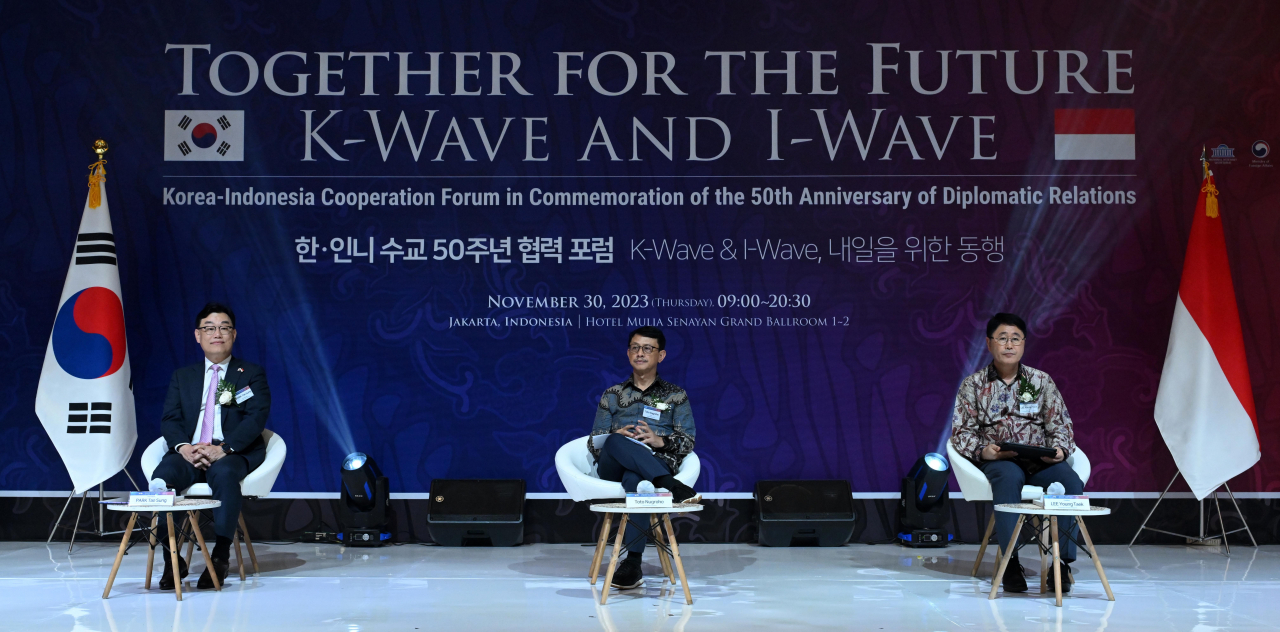[Hello Indonesia] Unlocking potential of EV partnership
By Park Han-naPublished : Dec. 3, 2023 - 17:55

JAKARTA, Indonesia -- The combination of Korea’s top battery manufacturing technology and Indonesia’s abundant minerals makes them ideal partners in the burgeoning electric vehicle market.
“If Indonesia, the world's largest nickel producer, cooperates with the Korean battery industry, the synergy they could create would be tremendous,” Korea Battery Industry Association Executive Vice President Park Tae-sung said during a collaborative session on EVs and e-waste management of the Economic Cooperation Forum on Thursday.
Park said Korean battery makers would be the best fit for Indonesia because of their competitiveness in technology, production capability, skilled manpower and global market management system.
Korean battery manufacturers supply EV batteries to global automakers in the United States, Europe, and Japan.
“Through cooperation with K-Battery, Indonesia will be able to participate in the global battery supply chain and gain access to the US and European markets," he said.
“All of these Korean battery companies will be great business partners in building the Indonesian battery ecosystem,” he added, describing an integrated battery value chain ranging from materials to production to recycling Korea's key competitiveness.
Hyundai Motor Group has also invested heavily to secure a firmer footing in Indonesia, one of the fastest-growing EV markets, as it is building a battery cell and pack plant there for its locally produced EVs, including the best-seller Ioniq 5.
"Starting in 2024, we will launch a reasonably priced B-segment SUV equipped with batteries produced locally in Indonesia," said Lee Young-tack, president of Hyundai Motor Asia-Pacific Headquarters.
The automaker is also pushing for partnerships with Indonesian firms, starting with a collaboration with Plaza Indonesia, a landmark shopping mall in central Jakarta, to expand the network of EV charging stations for the public, he added.
In addition to Nickel, copper and aluminum give Indonesia an economic advantage of rich mineral resources endowment, Toto Nugroho, CEO of Indonesia Battery Corporation said.
“We are working on maximizing the potential of Indonesia's resources by establishing a synergized EV battery ecosystem end-to-end from upstream to downstream. To support Indonesia as a production base and hub for battery production and EVs in ASEAN,” he said.
The Indonesian government expects 400,000 units of four-wheel EVs, together with 1.76 million two- or three-wheel EVs, to hit the road by 2025. The nation's total domestic battery demand is projected to almost triple from 20 gigawatt-hours in 2030 to 59 GWh in 2035.
“Especially, the electric 2-wheeler market is expected to grow continuously. We are giving an impetus to the market by making a battery swap easily,” he said.
“As Indonesia will continue its investment in stimulating EV growth and adoption, Korean companies could seek business opportunities in those areas.”



















![[Today’s K-pop] Treasure to publish magazine for debut anniversary](http://res.heraldm.com/phpwas/restmb_idxmake.php?idx=642&simg=/content/image/2024/07/26/20240726050551_0.jpg&u=)